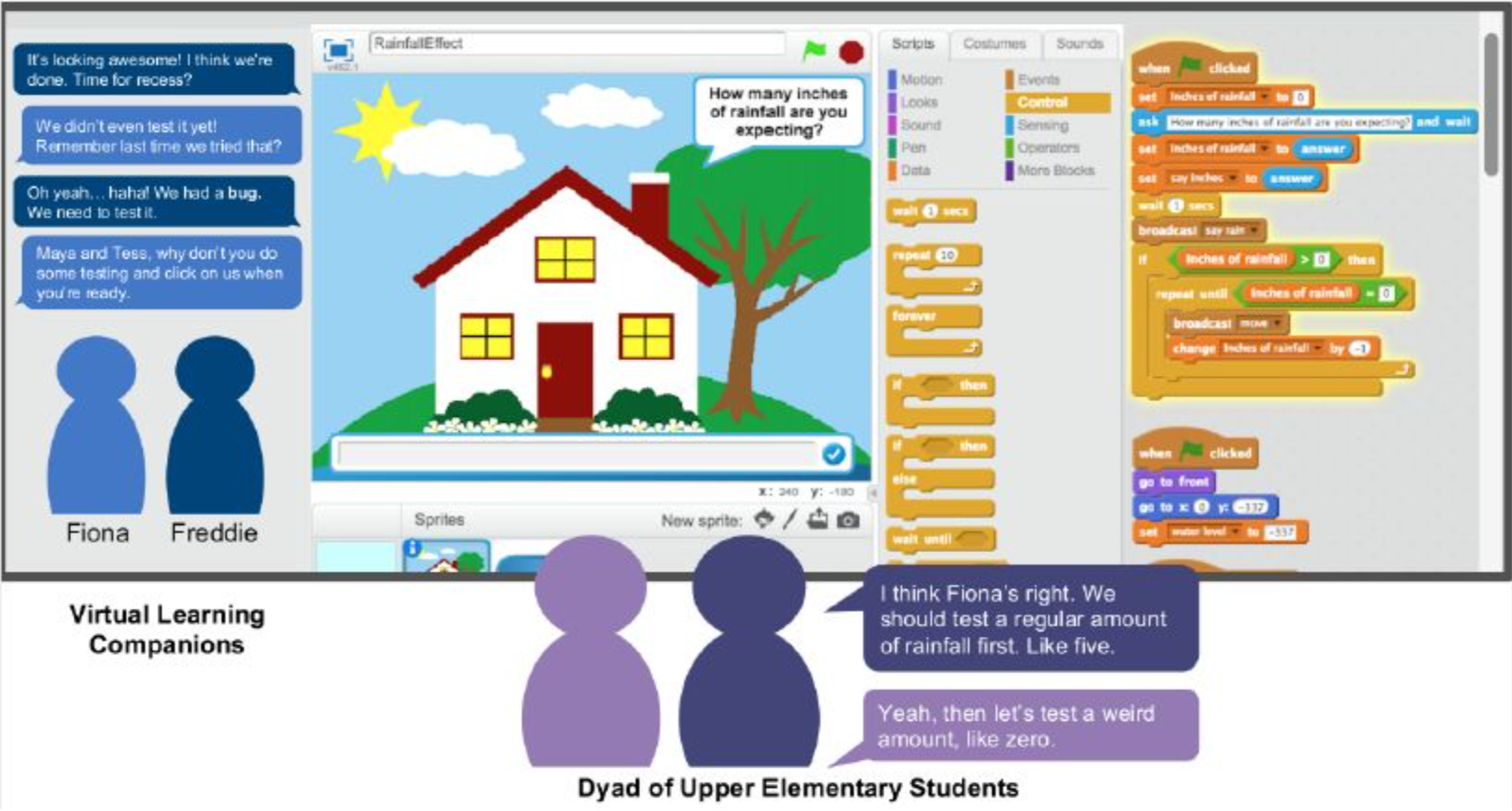
FLECKS
Fostering collaborative computer science learning with intelligent virtual companions for upper elementary students. (Funding: National Science Foundation, DRL-1721160)
Introduction
One of the central tenets of modern computer science is that it is a collaborative discipline. The importance of collaboration is emphasized in the new K-12 Computer Science Framework, and collaboration is increasingly emphasized in the computer science industry and by professional societies. Relatedly, curricular frameworks such as the Next-Generation Science Standards also emphasize collaboration and computational thinking as practices that students must engage in “across all grade bands.” Yet, many students reach high school and college without ever learning to collaborate well, particularly with diverse peers. The FLECKS project will create a collaborative computer science learning environment for upper elementary school classrooms, addressing the pressing need for young students to develop fundamental computer science competencies and collaboration practices. This project is led by PI Kristy Boyer at the University of Florida, and PI Eric Wiebe and co-PI Collin Lynch at North Carolina State University.
Project Description
The FLECKS project will provide the potentially transformative opportunity for upper elementary students to learn computer science and build strong collaboration practices. Leveraging the great promise of virtual learning companions, we will address the following three thrusts. 1) We will collect datasets of collaborative learning for computer science in diverse upper elementary school classrooms. Our initial dataset will provide a ground-truth measure of students' collaboration approaches to classroom computer science learning tasks. 2) We will design, develop, and iteratively refine FLECKS' intelligent virtual learning companions, which support dyads of students in a scaffolded computer science learning environment with an interactive online coding tool. The technical innovation of FLECKS is the way in which student dyads are supported: each pair of children within the elementary school classroom will interact with a dyad of state-of-the-art intelligent virtual learning companions. These companions will enhance the classroom experience by adapting in real time to the students' patterns of collaboration and problem solving to provide tailored support specifically for that pair of students. 3) We will generate research findings and evidence about how children collaborate in computer science learning, and how best to support their collaboration with intelligent virtual learning companions.
publications
| 2020 | |
| [8] | A Comparison of Two Pair Programming Configurations for Upper Elementary Students. Jennifer Tsan, Jessica Vandenberg, Zarifa Zakaria, Joseph B. Wiggins, Alexander R. Webber, Amanda Bradbury, Collin Lynch, Eric Wiebe, Kristy Elizabeth Boyer. Proceedings of the 51st ACM Technical Symposium on Computer Science Education (SIGCSE), Portland, Oregon, 2020, pp. To appear. [bib] |
| 2019 | |
| [7] | Collaborative Talk Across Two Pair-Programming Configurations. Zarifa Zakaria, Danielle Boulden, Jessica Vandenberg, Jennifer Tsan, Collin F. Lynch, Eric N. Wiebe, Kristy Elizabeth Boyer. Proceedings of the 13th International Conference on Computer Supported Collaborative Learning (CSCL), 2019, pp. 224-231. [bib] |
| [6] | From Doodles to Designs: Participatory Pedagogical Agent Design with Elementary Students. Joseph B. Wiggins, Jamieka Wilkinson, Lara Baigorria, Yingwen Huang, Kristy Elizabeth Boyer, Collin Lynch, Eric Wiebe. Proceedings of the 18th ACM International Conference on Interaction Design and Children, 2019, pp. 642-647. [bib] |
| [5] | "I Impressed Myself With How Confident I Felt": Reflections on a Computer Science Assessment for K-8 Teachers. Hannah E. Chipman, Fernando J. Rodríguez, Kristy Elizabeth Boyer. Proceedings of the 50th ACM Technical Symposium on Computer Science Education (SIGCSE), 2019, pp. 1081-1087. [bib] |
| [4] | The Interface Design of a Collaborative Computer Science Learning Environment for Elementary Aged Students. Amanda Bradbury, Eric Wiebe, Jessica Vandenberg, Jennifer Tsan, Collin Lynch, Kristy Boyer. Proceedings of the Human Factors and Ergonomics Society Annual Meeting, 2019, pp. 493-497. [bib] |
| 2018 | |
| [3] | User Affect and No-Match Dialogue Scenarios: An Analysis of Facial Expression. Joseph B. Wiggins, Mayank Kulkarni, Wookhee Min, Kristy Elizabeth Boyer, Bradford Mott, Eric Wiebe, James Lester. Proceedings of the 4th International Workshop on Multimodal Analyses enabling Artificial Agents in Human-Machine Interaction (MA3HMI), 2018, pp. 6-14. [bib] |
| [2] | "Alright, What Do We Need?": A Study of Young Coders’ Collaborative Dialogue. Jennifer Tsan, Collin F. Lynch, Kristy Elizabeth Boyer. International Journal of Child-Computer Interaction, vol. 17, 2018, pp. 61-71. [bib] |
| [1] | "I Think We Should...": Analyzing Elementary Students' Collaborative Processes for Giving and Taking Suggestions. Jennifer Tsan, Fernando J. Rodríguez, Kristy Elizabeth Boyer, Collin Lynch. Proceedings of the 49th ACM Technical Symposium on Computer Science Education (SIGCSE), Baltimore, Maryland, 2018, pp. 622-627. [bib] |

